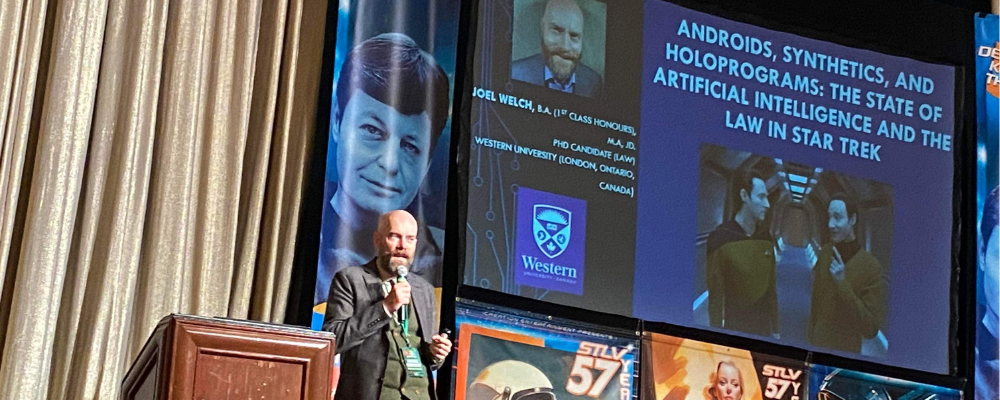PhD candidate Joel Welch explores science fiction’s influence on emerging technology regulation
October 06, 2023

It wasn’t long ago that the artificial intelligence (AI) technologies becoming commonplace in our lives and work were only the stuff of science fiction. If you ask Joel Welch, JD ’10, and current PhD student at Western Law, there’s a lot that science fiction can teach us about how real-world legal frameworks should evolve to regulate emerging technologies.
As a self-professed Star Trek and general science fiction enthusiast, Welch has long been intrigued by the ways in which the genre enables exploration of the potentials and pitfalls of technologies such as AI. After his JD studies, Welch stayed in touch with fellow sci-fi lover Professor Randal Graham and connected often for lively discussions on the topic. It was Graham who ultimately encouraged Welch to return to Western to complete his PhD after a total of 15 years serving in the RCMP in the areas of federal policing, organized crime and national security.
“If [Professor Graham] wasn't a science fiction fan, I wouldn't have made the leap to go back into academia,” reflected Welch. “It speaks to his openness to think about important ideas and notions in terms of public policy, by extrapolating facts from the present through narrative to try to figure out the best way to proceed in the future.”
Welch’s dissertation uses science fiction as a tool to explore the consequences and implications of emerging technologies and how legal policymakers should respond, using imagination, exploration, and sometimes, speculation. He argues that science fiction is an important tool available to policy makers that provides a common language to discuss issues and allows for an examination of potential problems before they arise.
In August, Welch had the opportunity to combine his passions for law, AI and Star Trek when he took to the stage to present on these topics at the 2023 Star Trek Convention in Las Vegas. The annual convention attracts thousands of fans, actors, producers and writers and also holds sessions for professionals across industries – including attendees from Apple, Microsoft and NASA – on the more intellectual endeavors the show inspires.
“I spoke about androids, synthetics and holographic programs in Star Trek and how the series poses questions, and attempts to provide some answers, about what constitutes life and what life is worth protecting from a legal point of view in terms of legal rights and obligations,” said Welch.
In his presentation, Welch highlighted an example of how Star Trek the Next Generation explored the concept of legal property in relation to androids. In season two, episode nine, The Measure of a Man, an android named Data is put on the stand in a military tribunal because a scientist wanted to dissect, destroy and replicate them to advance AI.
“The episode presents these ideas and notions of what is worth protecting,” explained Welch. “Data recognized the danger of that and did not want to participate. So, the episode calls for reflection on what constitutes property.”
While Welch explored the ethics of AI in the realm of science fiction, the current day impacts of AI on the entertainment industry played out at the conference in real time. Over 150 Star Trek actors and producers in attendance were part of the Writers Guild of America (WGA) and Screen Actors Guild-American Federation of Television and Radio Artists (SAG-AFTRA) strikes, which notably are fighting for protections against the use of AI diminishing their livelihoods. While union members struck a deal to attend the conference, the ongoing strikes offered a strong illustrative example of the pitfalls of AI for employment rights.
Welch is cautiously optimistic about the future of artificial intelligence. He believes there will be great potential for research, development and scientific advancement, but also fears the misuse of AI in situations like spreading political disinformation or creating biological and chemical weapons. He hopes that his research will encourage much needed dialogue on regulation before it’s too late.
“The big takeaway from my conference presentation, was the importance of good values, principles and morality because bad things happen when we lose sight of them,” said Welch. “AI is going to change society likely within our lifetime, serious thought has to be given to it in order to prevent harm, and to ensure that societal cohesion remains.”






